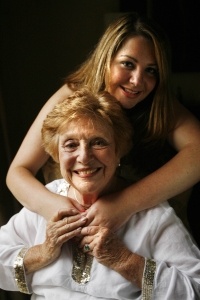c. 2008 Religion News Service
NEW ORLEANS _ Twenty-three and single, Katie Tutwiler is another of those idealistic young people pouring into post-Katrina New Orleans.
Tutwiler moved to New Orleans fresh out of college last summer, tugged by something like a moral call to join the city’s great story of post-hurricane reconstruction.
Although she is only nominally Jewish, Tutwiler has been aggressively courted by the area’s Jewish community. She received a $1,000 moving grant and was offered a year’s free dues to a synagogue and a one-year membership to a Jewish community center.
The recruiting effort may be paying off. Tutwiler, a self-described religious “seeker” shopping for a religious identity, has signed up with Birthright Israel for a free trip to Israel this summer, even as her personal exploration also occasionally includes attending Catholic Masses.
Tutwiler is in play, so to speak, and thus qualifies as a poster child for the New Orleans Jewish community’s year-old “newcomers program,” which to date has devoted an estimated $180,000 to recruit young Jews to rebuild the city’s Jewish community, and the larger city as well.
That’s just one of the initiatives in a five-year “strategic plan” New Orleans Jews recently fashioned as part of a $24 million blueprint to revitalize a small but sturdy community that had been shrinking and graying even before Katrina made landfall in 2005.
The plan’s first goal is to recruit young Jews to New Orleans and nourish them here, and the newcomers program is the centerpiece so far. But plans are afoot to fashion incentives to retain at least 50 of the area’s 400 to 500 Jewish college students who graduate each year, said Michael Weil, executive director of the Jewish Federation of Greater New Orleans.
Besides recruiting, there are 11 goals in the community’s new strategic plan, said Weil, including maintaining ties with an estimated 3,500 permanently dislocated Jewish New Orleanians; building support systems to nourish Jewish families; fostering collaboration among local Jewish institutions; developing Jewish education; and a national fundraising and public relations campaign.
“It’s ambitious, it’s doable and we’re going to make it happen,” said Weil, an economist and strategic planner who worked in Israel before he was hired by the federation in 2006.
The newcomers program that aided Tutwiler so far has distributed incentives to some 116 Jewish individuals or families, said Jennifer Samuels, who helps run the program.
Weil estimated the total number of Jewish newcomers, including those who didn’t apply for incentives or haven’t yet been identified, is closer to 850.
The day Katrina made landfall, the area’s Jewish community was estimated to be about 9,500 (less than 1 percent of the metro area population), down from an estimated 13,000 nearly 25 years ago.
Research by Louisiana State University sociologist Frederick Weil and others estimated that Katrina reduced the area’s Jewish population to about 6,000 in the summer of 2006. They believe the number rebounded to 7,000 to 8,000 earlier this year.
Tutwiler said her decision to come to New Orleans was born out of a desire to join a wounded but still fascinating community, and was not triggered by the financial incentives package.
Indeed, as the daughter of an Episcopalian father and a nonobservant Jewish mother, she said she grew up in a home with no strong religious influence. She knows only the opening phrases to a few common Hebrew prayers, and until recently, she did not know there was a synagogue in her hometown of New Iberia, La., about 100 miles west of New Orleans.
“I’m Jewish,” she said, “but not quite in the fold.”
Tutwiler heard about the Jewish incentives program from her grandmother, Catherine Kahn, a New Orleanian and board member at Temple Sinai, who urged Tutwiler to check it out.
Now Tutwiler sometimes accompanies her grandmother to temple, a starting point from which Tutwiler has begun to inquire about her Jewish heritage.
In that sense she is quite typical, Michael Weil said.
“There’s a pattern here” among newcomers, Weil said. “They tend to be on the margins of mainstream Jewish life. These are not your regular synagogue-goers. Their Judaism is more virtual than real. They’re less actively involved. But they’re motivated. They see themselves as pioneers.”
He said their willingness to help rebuild the city often is part of a deeply Jewish imperative toward public service called “tikkun olam,” or “repairing the world.”
“You’d think that when you’re hit with a major disaster it would knock you flat and you wouldn’t have the strength to get up again,” Weil said.
“But what this community has said is we’re not accepting that. We think we’re important, and we have a future, and we intend to go to some significant place, and we’ll do whatever it takes to get there.”
(Bruce Nolan writes for The Times-Picayune in New Orleans.)
KRE/PH END NOLAN
A photo of Katie Tutwiler and her grandmother is available via https://religionnews.com.





